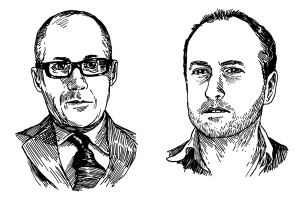Aleksandar Hemon is the author of four works of fiction, including the novel The Lazarus Project (Riverhead 2008) and a short story collection, Love and Obstacles (Riverhead 2009). He was born in Sarajevo, Bosnia-Herzegovina, where he lived until he ended up in Chicago, where he lives now.
Colum McCann is the author of seven works of fiction, including the National Book Award–winning novel Let The Great World Spin (Random House 2009), Zoli (Random House 2007), and Dancer (Metropolitan Books 2003). He was born in Dublin, Ireland, and now lives in New York where he teaches in the Hunter College MFA Creative Writing program.
This conversation is an email continuation of a series of conversations between Hemon (a.k.a. Sasha) and McCann. The most memorable one took place in Lyon, France, some years back, which ended in a bar with an unreal collection of whiskeys, with both men singing “Waltzing Matilda” to the accompaniment of a choir of humming Frenchmen. That much is recalled—the rest is supplied by the imagination and the whiskey’s after-kick.
COLUM McCANN: What are we doing here? Why aren’t we in a pub?
ALEKSANDAR HEMON: Because you live in the provinces, far away from everything.
CM: So, we’re here… to talk (as the bishop to the hooker). The next question is: why are we here? That, of course, is easy to answer. But, seriously, sometimes I wonder if we—I mean, we, us, as writers—have to increasingly justify ourselves, you know, like visual artists, whose primary mode of entry into their art seems to be the painstaking explanation of it. Forget the painting. There’s a whole business built up around it. The artists have to acquire a specific language. Have you read any of those “statements of purpose” (!) by some of the contemporary artists? It’s like stepping through acres of fresh tar. You pick one foot up only to find the other sinking further.
AH: Actually, I have not read any of those statements of purpose, but I can imagine what they look like. I wouldn’t be so hard on artists, though. On the one hand, every artist, writers included, have an ethics and an aesthetics, whether they can formulate them or not. I happen to think that it is good to be able to formulate—it is good to know what you are doing and to be able to talk about it. On the other hand, art is so widely (and often thinly) spread, that anything can be it. A lot of it is nothing but a gesture, not an object, not a thing unto itself, and it literally does not exist without interpretation. I am...
You have reached your article limit
Sign up for a digital subscription and continue reading all new issues, plus our entire archives, for just $1.50/month.
Already a subscriber? Sign in





